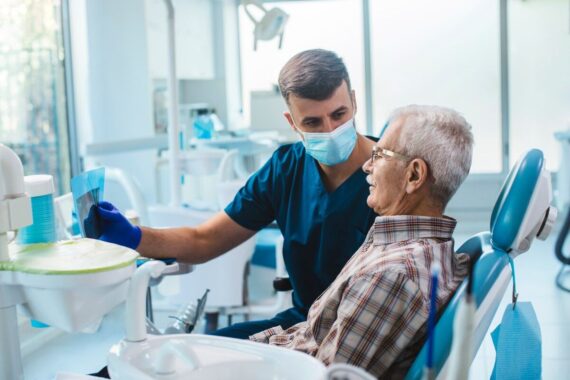NHS-funded dental services in England are in ‘near-terminal decline’ and will be gone for good without radical action, a report from the Nuffield Trust has warned.
A combination of worsening access problems, a funding squeeze, the pandemic and growing inequalities has put NHS dentistry at ‘its most perilous point’ in 75 years, the report said.
With its future hanging in the balance, NHS dentistry needs urgent action either through further means testing, extensive reforms to dental contracts combined with huge staffing boost or a large injection of funds, the Nuffield Trust said.
At the very least there is an ‘urgent imperative’ to provide a basic core service for children, older people and those who cannot afford private care, it noted.
The report authors also noted there were troubling lessons to be learnt for other parts of NHS primary care.
The data shows almost six million fewer courses of NHS dental treatment were provided last year than in 2019.
And funding in 2021/22 was over £500m lower in real terms than in 2014/15, the analysis showed.
It has meant widespread problems in accessing a dentist, with the issue particularly marked for people from Black and Asian ethnic groups.
Children’s oral health is a particular concern, the report warned, with tooth decay the most common reason for a hospital admission for children aged six to ten years.
Figures compiled by the Labour Party and also published this week suggest eight in ten dental surgeries are not taking on new adult NHS patients with seven in ten not accepting new child patients.
The pandemic has exacerbated a ‘drift’ to the private sector with dentists reducing their NHS work and carrying out fewer NHS-funded treatments, the report found.
Immediate short-term action is needed to shore up the current service with recommended measures including increasing the intervals between routine check-ups and tempting dental therapists into the NHS from the private sector.
But in the longer term it will require improving the current fee-for-service model while also moving to a ‘needs-based’ approach similar to general practice through making use of patient lists.
It will also mean adjusting the NHS offer through either a huge injection of funding, which the report notes is unrealistic, or scaling it back to a minimum offer for patients.
Lead report author Wilf Williams said ‘continued neglect’ of dental policy is not a viable strategy.
‘The result is a widening gulf between the Government’s stated aim that everyone who needs one should be able to access an NHS dentist and the dire reality of elusive and increasingly unaffordable care.’
And he added there are troubling lessons for the wider health system. ‘Without political honesty and a clear strategy, the same long-term slide from aspiration to reality could happen in other areas of primary care too.’
Nuffield Trust chief executive Thea Stein said: ‘We need to see immediate action taken to slow the decay of NHS dentistry, but it is increasingly clear that we can no longer muddle through with an endless series of tweaks to the contract.
‘Difficult and frankly unpalatable policy choices will need to be made, including how far the NHS aspires to offer a comprehensive and universal service, given that it does not do so at present.
‘If, as seems, that the original model of NHS dentistry is gone for good, then surely the imperative is to provide enough access for a basic core service for those most in need.’
Professor Azeem Majeed, professor of primary care and public health at Imperial College London said the lack of NHS dental care meant patients often turning to their GPs for help but not being trained in dentistry they can only offer limited support.
‘I have often seen patients who should have gone to a dentist because they were unable to access NHS dental services easily.
‘This not only increases the workload of GPs but does not address the underlying dental issue. Patient seeing GPs for dental problems also increases the risk of missed or delayed diagnoses, which can result in poorer outcomes (as well as additional costs) when patients finally seek treatment from a dentist.’
He added the decline in NHS dental services was disproportionately affecting people from lower-income groups exacerbating health inequalities.









Harbinger of future General Practice?
Reminiscent of a visit request years ago – to confirm death in what was by then a badly decayed corpse.
Why are those of us who cannot access NHS dentistry still obliged to pay taxes for what service remains?
I agree MM, GP primary care isnt that far behind!
How did they measure dental decay as most common reason for hospital admission in children aged 6-10 ?
In 12 months of Paediatrics in New Zealand in 1996, we had not a single child admitted for that reason.
Our local DGH here would not be fair comparison, as there is no dental service, so no children admitted for dental issues – I think only 2/5 of our local DGHs have part-time dentistry available, even at 2 hours drive from here.